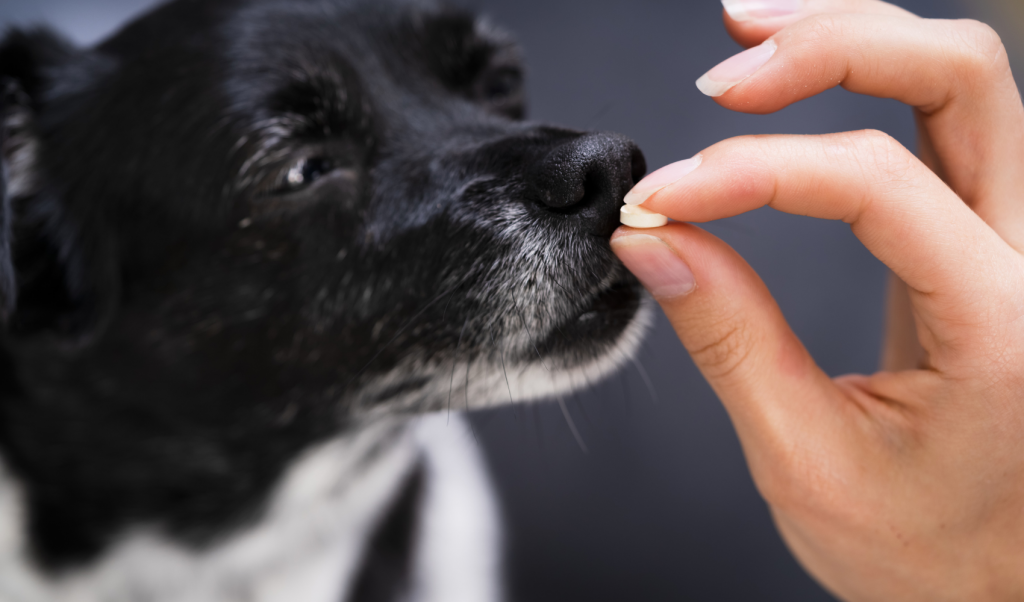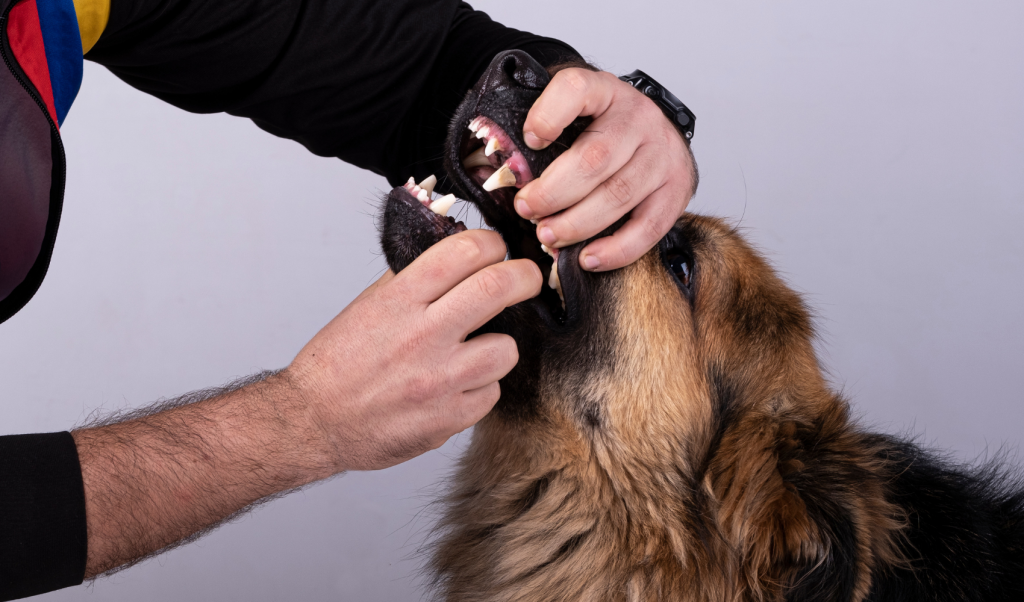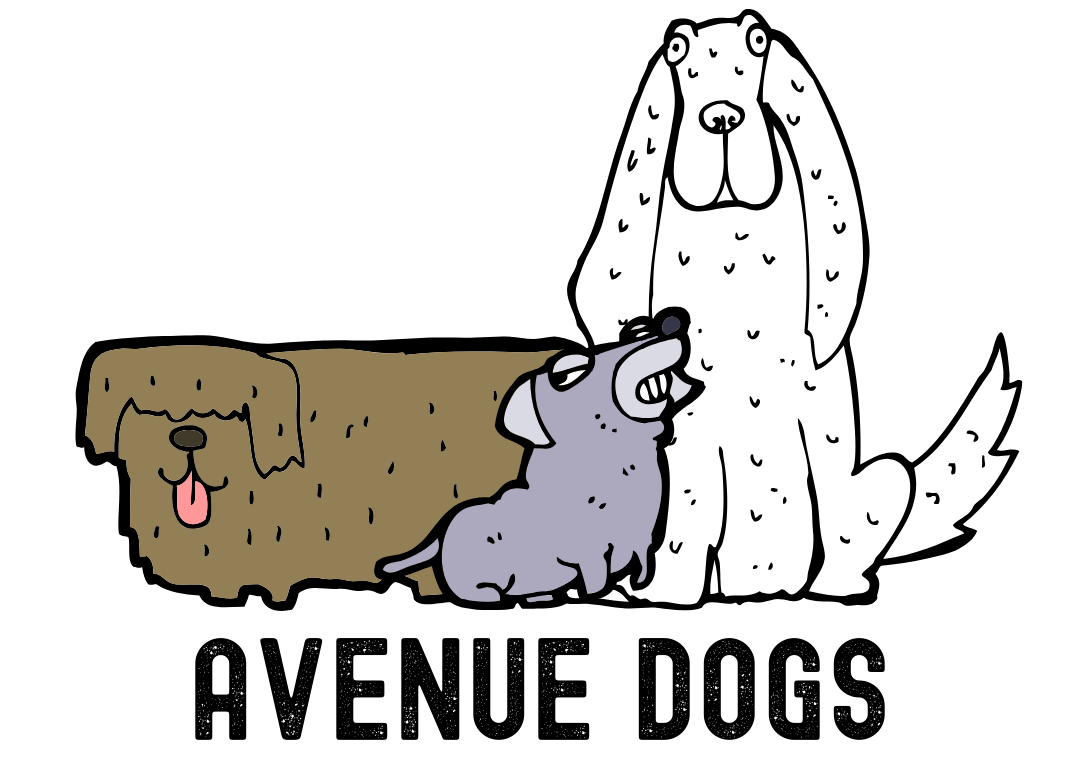


Do you find yourself asking, “why is my dog dry heaving”? Our vet is here to answer that question and to determine if a trip to the vet is in order.
If you’d rather listen to this blog, just click play on the YouTube video below:
Dry Heaving and Vomiting
Dry heaving and vomiting may or may not happen at the same time. Vomiting is the expulsion of stomach contents out through the mouth. Sometimes, your dog tries to vomit, but nothing comes out. The attempt to vomit without producing anything is referred to as dry heaving.
Most of the time, dry heaving occurs after vomiting, and it may produce mucus or saliva but no stomach contents. Dry heaving is sometimes accompanied by coughing, gagging, and drooling. If you are a pet owner, you already know that vomiting is not something unusual for dogs, and neither is dry heaving during or after vomiting.
The problem with dry heaving isn’t so much the heaving, but the underlying cause of the dry heaving. Below I’ll get into some of the causes of dry heaving, as well as some preventative measures to make sure you never have to ask, “Why is my Dog Dry Heaving?” again.
Dry Heaving and Sneezing

Some dog owners confuse dry heaving with sneezing. Sneezing happens when some irritant gets stuck in the airway and causes an allergic reaction. It has nothing to do with digestion. In addition, dry heaving is also different from vomiting. In fact, all three symptoms are different from the other. Dry heaving can have many causes; let us discuss them all in detail.
Why is my Dog Dry Heaving? What are the Causes?
Most of the time, dry heaving does not affect your dog. The heaving goes away after some time without causing any serious damage. However, the situation can sometimes worsen when the underlying cause is serious. The most common causes of dry heaving in dogs are as follows.
Nausea and Stomach Upset



Nausea is one of the main causes of dry heaving. In humans and dogs, nausea occurs every time there is a stomach upset. In most cases, nausea occurs when your dog eats something new or remains hungry for a long time.
Nausea can be easily treated at home; you don’t need to worry about that. You can talk to your vet for medication, and your dog will be cured. However, if there is a serious underlying cause of nausea, your vet will recommend a complete examination at their clinic to rule out the cause.
Gastric Dilatation-Volvulus
The causes of dry heaving can sometimes be severe such as gastric dilatation-volvulus. This condition is commonly known as bloat, which occurs when air gets filled in the stomach. The stomach contorts and looks like the abdomen is swollen. The symptoms of this condition include salivation, dry heaving, whining, and swollen abdomen.
You should immediately take your dog to the vet if you see your dog developing symptoms of gastric dilatation.
Eating too Quickly

Your dog should have the habit of eating at a normal pace. If your dog eats too fast, he may end up choking on food. Choking results when a dog eats kibble too fast and it gets stuck in the airway. In that situation, your dog may try to cough up or expel the food to remove the obstruction, resulting in dry heaving. If your dog has a habit of eating too fast, I recommend the following dog food bowl to slow their eating.
(Keep in mind: Avenue Dogs is reader-supported. When you buy through links on our site, we may earn an affiliate commission (with no additional cost to you)).
Obstruction
Sometimes dogs end up eating something other than food, and it gets stuck in the throat, mouth, or GI tract. Obstruction of any kind will lead to dry heaving, and it is one of the serious medical conditions that need immediate veterinary care. Your dog will show the signs of mouth or throat obstruction by pawing at the face, dry heaving, or choking. At the same time, the GI tract obstruction will express itself with constipation, vomiting, and fatigue.
Respiratory or Cardiovascular Problems
Dry heaving can be the result of severe health complications in which the heart or lungs are affected, such as heartworm. Many heart conditions can result in the obstruction of the airway and result in dry heaving. Other than dry heaving, heart, or lung problems, symptoms include changes in activity level, vomiting, and tiring quickly.
Diagnosis of such problems is tricky and can only be handled in person by a professional veterinarian.
Kennel Cough
One of the most common respiratory problems in dogs is kennel cough. It is a highly contagious disease in which dogs continue to cough and dry heave. In most cases, dogs can get over kennel cough without any treatment. However, it is very important to isolate your diseased dog; otherwise, the disease will be spread to other dogs. Check out the video below to see the symptoms of kennel cough.

Allergies
Dogs can develop many different forms of allergies. Most commonly, food allergies can lead to dry heaving in dogs. Food allergy develops due to certain types of meat, gluten, and grains. Respiratory tract allergies can also lead to dry heaving. You can observe dry heaving in your dog when allergens are present in the air. Environmental changes can also lead to respiratory allergies and resultantly dry heaving.
When you observe your dog developing swelling on the mouth, having rashes on the body, or a change in the color of skin, you should immediately take your dog to the vet.
Intestinal Disease
Digestive tract problem is the leading cause of dry heaving. Your dog can suffer from inflammatory bowel disease and certain other intestinal conditions. All these conditions usually result in dry heaving accompanied by blood or mucus in the vomitus or feces. This will require an immediate trip to your vet.
Tumors
Tumors can develop anywhere in the body. But when they grow in the lungs or throat, they block airflow. Dogs with respiratory tumors cough so hard that it turns into gag reflux and resultantly dry heaving. You should immediately see your vet in this condition.
Medication Side Effects



Certain medications can also result in dry heaving. You may observe your dog dry heaving when you administer medicine with an empty stomach. In addition, certain medications can result in allergies, commonly called drug allergy or sensitivity. Immediate veterinary healthcare is the solution to this problem too.
Why is my Dog Dry Heaving and What Should I do About It?
The first approach should be to remove everything from your dog’s access that is of potential danger. Check your dog for anything stuck in the mouth or throat. See if your dog is having trouble breathing, is coughing, has swelling of the abdomen, or anything abnormal. If you believe your dog is experiencing any of the symptoms mentioned above, you should immediately take your dog to an emergency veterinarian.



However, if your suspect your dog is just experiencing nausea, you can administer vet-approved meds to relieve this condition.
Why is my Dog Dry Heaving and How do I Prevent It?
Here are certain guidelines to prevent your dog from dry heaving:
- Don’t let your dog eat anything other than dog food.
- Try to slow down the pace of your dog’s eating.
- Make sure your dog eats something before taking any medication.
- Avoid kibble containing lots of soybean meal or fats.
- Get your pup vaccinated against kennel cough.
The easiest way to avoid your pup’s dry heaving is to use the preventative measures listed above.
Hopefully your “Why is my Dog Dry Heaving?” Questions have Been Answered



Dry heaving is not much of a problem when no serious underlying cause exists. You should follow the guidelines above to protect your furry friend against serious conditions that cause dry heaving. If your dog happens to start dry heaving, you should try to find the cause and consult your veterinarian for further solutions.
If you’re still asking, “Why is my Dog Dry Heaving?”, and you’ve ruled out any emergency situations, you can take a video of the incident and contact me below. I can take a look at the video and give you my professional opinion on your dog’s dry heaving.



Dr Saba Afzal is a clinical veterinarian and a professional content writer. I am determined to disseminate ideas worth spreading to pet owners everywhere around the world. As an experienced veterinarian, I am dedicated to delivering accurate and updated knowledge to pet owners
I have more than five years of experience in content writing on different online platforms, including Fiverr, Upwork, and Guru. My expertise is in Microbiology, Biotechnology, Pets Animal Management and handling, and training. You will find my content truly fascinating, unique, and compatible with the world’s standards. I always write original content without any plagiarism and taking care of any grammatical errors.
I will be happy to address your queries and comments. Contact me here

2 Comments